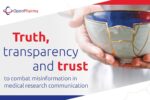This week, we highlight how Chiesi expanded copyright compliance and improved content access, understand the role of AI tools in fighting paper mill fraud, and read about STM group’s recommendations for ethical AI use in manuscript preparation. We also highlight innovations designed to improve patient experience in early phase clinical trials. Finally, we look at a report from Springer Nature on how academic research is shaping SDG policy and driving open access partnerships.
To read:
Chiesi library expands copyright compliance and access via Copyright Clearance Center | 3-minute read
The Chiesi library team identified a significant gap in copyright knowledge across the organization, which created challenges for compliance and proper content usage. To strengthen copyright compliance across the company, the cross-functional library team organized department-specific educational sessions. They also created one-page tip sheets tailored to each department’s practical needs and provided employees with access to the Copyright Clearance Center’s RightFind suite. Today, Chiesi users can effectively use RightFind to access and manage licensed content, at any time, regardless of where they are working.
AI tools help publishers fight paper mill fraud via Chemistry World | 6-minute read
Paper mills, which produce fraudulent scientific manuscripts for profit, have become a major threat to research integrity. The magnitude of the issue was revealed when Hindawi, a branch of publisher Wiley, removed more than 8000 papers suspected of being produced by paper mills in 2023. This article explores how publishers are using artificial intelligence (AI) technologies and automated tools to verify author credentials, ghost references and missing disclosure statements. It also highlights the launch of the International Association of Scientific, Technical & Medical Publishers (STM) Integrity Hub for duplicate submission check, which aims to detect multiple submissions across different publishers. Additionally, the article considers the use of AI and automation tools to support editors by detecting post-publication fraud and identifying potentially fraudulent papers before peer review.
First-hand perspectives of individuals who have participated in early phase trials via Oncotarget | 4-minute read
Early phase clinical trials are essential for the development of new treatments, but the experience of the patients participating in such studies remains unclear. This article provides a first-hand account of the experiences of three individuals who have participated in early phase biomarker trials, and it highlights the benefits and challenges of such studies. Participating in early phase clinical trials allow patients access to novel therapies and receive close monitoring and high-quality care. However, challenges continue around trial eligibility and access, financial and logistical burden, and lack of communication and transparency regarding treatment expectations, test results and long-term follow-up. This article highlights the need for patient-centred trial designs and patient-centric innovations, such as trial navigators and improved communication and transparency to enhance patient experience. As biomarker-matched therapies become more common, it is inevitable that patient perspectives will play an increasingly significant role.
Academic research can help achieve UN SDGs via Springer Nature| 3-minute read The United Nations (UN) Sustainable Development Goals (SDGs) aim to tackle society’s most urgent challenges, including public health, climate change and social inequalities. This new report from Springer Nature, published in partnership with Overton, explores how research informs SDG-related policy. It shows that SDG policy documents tend to reference academic research more often than other policy areas with non-governmental organizations, intergovernmental organizations and think tanks playing an important role in connecting research to policy. The report highlights how open access publications are cited earlier and more frequently in SDG policy, particularly in low- and middle-income countries. It also suggests expanding open access and building partnerships to support evidence-based solutions.
To engage with:
STM recommendations for the classification of AI use in manuscript preparation via The Scholarly Kitchen | 3-minute read
Developments in generative AI (GenAI) over the past couple of years has led to an increase in the number of tools capable of supporting with manuscript writing, editing, formatting, and visual enhancement with images and diagrams. With this, comes the need for transparency around the use of AI to develop research articles. Publisher guidelines for authors have not kept up with the rapidly evolving AI technologies, leading to uncertainty on how to disclose the use of AI. To address this, in 2024, STM assembled a Task and Finish Group to create a classification of the different uses of AI, including GenAI, in manuscript preparation. The aim is for publishers of academic research to these recommendations in conjunction with the 2023 STM guidelines to determine which AI-assisted activities are permitted and how they should be transparently disclosed.
Enjoy our content? Read last week’s digest and check out our latest quarterly update!
Don’t forget to follow us on Bluesky and LinkedIn for regular updates!






